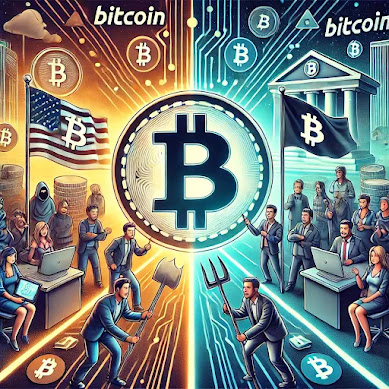The Real Reason Bitcoin Is So Polarizing: A Deep Dive Into Human Psychology
In the ever-evolving landscape of finance and technology, few innovations have sparked as much controversy and passionate debate as Bitcoin. What began as an obscure digital experiment has morphed into something far more significant – a movement that divides people into stark camps of fervent believers and steadfast skeptics. But beneath the surface of these heated debates lies a fascinating study in human psychology, revealing deep-seated beliefs about money, power, and the future of society.
The Bitcoin phenomenon transcends its technical foundations as a decentralized digital currency. For many, it represents an ideology, a revolutionary way of thinking about money and value. The intensity of reactions it provokes – from unbridled enthusiasm to vehement rejection – tells us more about human nature than about the technology itself. Critics dismiss it as a speculative bubble or a tool for criminals, while advocates herald it as humanity's best hope for financial freedom. Such extreme polarization begs the question: why does a piece of open-source code generate such emotional responses?
Our resistance to Bitcoin often stems from a deeply wired psychological aversion to paradigm shifts. Throughout history, humans have initially rejected transformative technologies, from the printing press to the internet. Bitcoin challenges our fundamental understanding of money – a concept so deeply ingrained in our daily lives that questioning it feels almost heretical. The complexity of its underlying technology creates an additional barrier, triggering our natural tendency to fear what we don't fully understand.
The comfort of the traditional financial system plays a crucial role in this resistance. We've grown accustomed to government-backed currencies and centralized banking institutions. This familiarity breeds a false sense of security, even as inflation erodes our purchasing power and financial crises expose systemic vulnerabilities. Bitcoin's mere existence threatens this comfortable illusion, forcing people to confront uncomfortable truths about the nature of money and state power.
Perhaps most intriguing is the emergence of "Bitcoin maximalism" – an unwavering belief in Bitcoin's supreme importance and inevitable success. This phenomenon mirrors religious devotion, complete with its own terminology, prophets, and sacred texts. The psychology behind this maximalist mindset reveals how humans seek belonging and meaning through shared beliefs. However, this tribal mentality can transform healthy conviction into blind faith, alienating potential adopters and reinforcing skeptics' concerns.
Bitcoin serves as a mirror, reflecting our individual relationships with money, risk, and change. Those who embrace it often exhibit "low time preference" thinking – the ability to delay gratification for future rewards. Conversely, its critics frequently display emotional rather than rational objections, revealing deep-seated fears about financial security and control. This division extends beyond mere investment preferences, touching on fundamental questions about trust, authority, and personal responsibility.
Media coverage has significantly amplified Bitcoin's polarizing nature. Traditional outlets often focus on price volatility and negative narratives, while cryptocurrency-focused media can present an overly optimistic view. This dichotomy creates an echo chamber effect, where both supporters and detractors find ample confirmation for their existing beliefs, further widening the ideological gap.
The generational aspect of Bitcoin adoption reveals another fascinating psychological pattern. Younger generations, having witnessed the 2008 financial crisis and growing up in a digital world, generally show greater openness to cryptocurrency. Their inherent skepticism toward traditional institutions contrasts sharply with older generations' trust in established systems. This divide isn't merely about technological comfort – it reflects fundamentally different worldviews shaped by distinct historical experiences.
One of the most powerful psychological factors driving Bitcoin rejection is the "too late" fallacy. Many dismiss Bitcoin partly because acknowledging its potential means confronting the painful reality of missed opportunities. This cognitive dissonance leads to a reinforcing cycle: each price increase makes it psychologically harder for skeptics to revise their position, leading to even stronger rejection.
As Bitcoin continues its march forward, understanding these psychological dynamics becomes increasingly important. Like every transformative technology before it, Bitcoin faces resistance not because of its technical merits or flaws, but because it challenges our fundamental assumptions about the world. Whether one views it as digital gold or digital tulips, Bitcoin's true significance lies in how it forces us to examine our beliefs about money, trust, and the future of human cooperation.
The polarization surrounding Bitcoin isn't just about technology or investment – it's a mirror reflecting our hopes, fears, and capacity for change. As we move forward into an increasingly digital future, understanding these psychological barriers and biases becomes crucial for bridging the divide between crypto-evangelists and skeptics. After all, Bitcoin's greatest contribution might not be technological but psychological – forcing us to confront how we think about value, trust, and the very nature of money itself.




Comments
Post a Comment